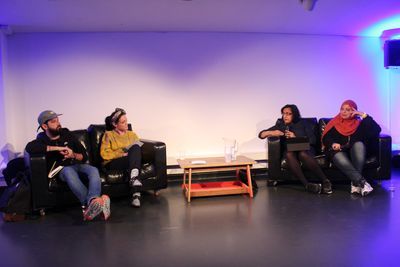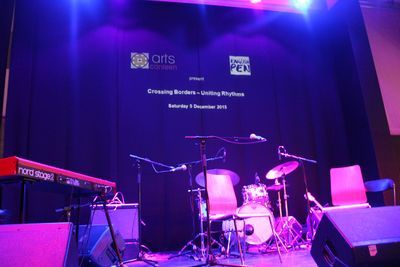You can't say that!

Omar El-Khairy, Sabrina Mahfouz, Ritula Shah and Shaista Aziz; credit: Rebekah Murrell/English PEN
By BENJAMIN POORE
Shoreditch can sometimes feel like the nadir of twenty-first-century triviality, so I was pleased to find myself, on Saturday afternoon, listening to a serious and clear-sighted discussion about freedom of expression in Rich Mix cinema. Discussions of this sort can be predictable, with attacks on political correctness, and libertarians demanding the right to say anything to anyone anywhere. Thankfully, none of the three panellists at English PEN���s "Crossing Borders" event once mentioned Voltaire.
Their conversation was shepherded (for a two-dozen-strong audience) with understated authority by the BBC���s Ritula Shah. "You Can���t Say That!" was part of a day of events organized by PEN, Rich Mix and the Arts Canteen with the title "Crossing Borders". The dramatist Omar El-Khairy spoke eloquently about the last-minute cancellation of Homegrown, his play about radicalization, by the National Youth Theatre earlier this year, after concerns were raised about its content. (I was pleased to read that it is now likely to be put on in the new year.) El-Khairy didn���t want to be seen as a free-speech martyr: ���I don���t want to be put in some kind of Salman Rushdie box���, he noted wryly.
The panellists��� experiences taught us that freedom of expression can emerge only in specific conditions and for specific people. Omar El-Khairy suggested that Homegrown might have been seen as a daring and sensitive intervention ��� and been staged ��� if it had been written by somebody else. The poet and filmmaker Sabrina Mahfouz spoke of a documentary she made about sex work; after Amnesty International produced a report recommending the global decriminalization of sex work, Mahfouz said the producers demanded that her piece take a position on this argument one way or the other. She said she was more interested in simply posing questions and allowing her subjects to speak for themselves. The programme was pulled. Freedom of expression finds itself under threat in certain contexts if it sails too close to ambiguity and ambivalence; or, to put it another way, we might say that sometimes expression is only possible if it operates within the established ways of speaking and thinking about a particular topic.
Shaista Aziz described her experience of making a BBC documentary (which was aired in the spring) about young Muslims in the poorer parts of Paris; saying "Je suis Charlie" demanded that they buy into a with-us-or-against-us narrative. Aziz and El-Khairy pointed out the troubled relationship the French Left (as well as the Right) have had with race and ethnicity. The arguments about Charlie Hebdo and free speech are perhaps less about freedom of expression in and of itself than they are to do with the terms under which you can be included within the liberal rhetoric of French republicanism. Aziz���s reflections suggested that not everyone gets to be French in the ways that supporters of Charlie Hebdo suggested were synonymous with the magazine.
At another event ��� the Arts Canteen���s "Uniting Rhythms", which was held on the main stage downstairs, in front of a packed audience ��� the Anglo-Iranian singer and tambok player Somaya gave us arrangements of Duke Ellington and Peggy Lee; and the spoken-word poet Fajr Tamimi, MC for the evening, read with defiance from her poem "The Tongue": ���So explain to me / one more time���, she intoned, each repetition growing in anger.
The night culminated in an extraordinary performance by Maya Youssef, who was playing the Kanun, or Qanun, a seventy-two-string harp with a history in various parts of South-eastern Europe and the Middle East. Youssef is studying for a PhD at SOAS, and uses music in her work with Syrian refugee children. She was trained in Western, Arabic and Azerbaijani classical and folk music, and this tangle of influences gives her performance an astonishing contrapuntal intensity. At certain moments, we could have been listening to the Goldberg Variations, or a sonata for harpsichord by Alessandro Scarlatti; at others, we were somewhere else entirely.
Those intertwined musical traditions offered an artistry of striking delicacy and immediacy ��� and affirmed the artistic possibilities that come from "crossing borders".
Peter Stothard's Blog
- Peter Stothard's profile
- 30 followers




